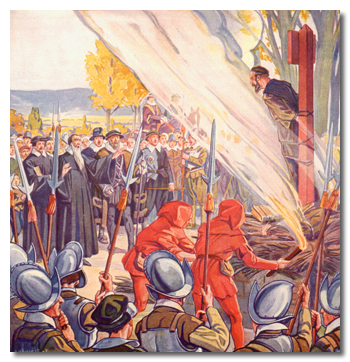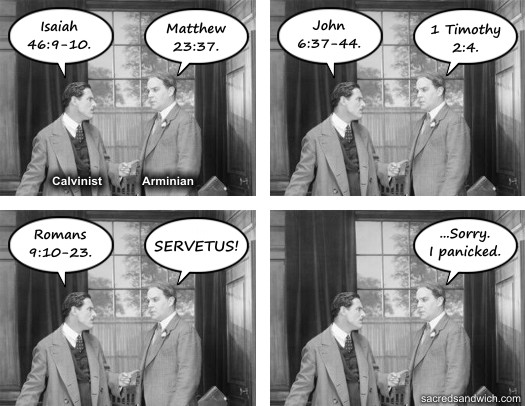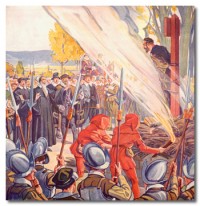 How do we explain this horrendous behavior of past Christians? The most popular way is to say that Christians of the past were influenced by their culture, and so were not at fault.
How do we explain this horrendous behavior of past Christians? The most popular way is to say that Christians of the past were influenced by their culture, and so were not at fault.
Just take one famous and contested example: the execution of Servetus by being burned at the stake. The primary accusation against Servetus was that he denied infant baptism and the classical conception of Trinity. There are numerous historical details surrounding his arrest, trial, and execution, but the main point is how modern Reformed historians explain these events. Here is one popular explanation from a well-known website and author:
The main facts therefore may now be summarized thus:
- That Servetus was guilty of blasphemy, of a kind and degree which is still punishable here in England by imprisonment.
- That his sentence was in accordance with the spirit of the age.
- That he had been sentenced to the same punishment by the Inquisition at Vienne.
- That the sentence was pronounced by the Councils of Geneva, Calvin having no power either to condemn or to save him.
- That Calvin and others visited the unhappy man in his last hours, treated him with much kindness, and did all they could to have the sentence mitigated.
Having read many of the details about this trial and execution, here is how these five points could be worded differently:
- Servetus did not believe in the Trinity or that babies should be baptized.
- At that time, people killed others for such theological differences.
- The Catholics did it too!
- Calvin wrote a letter recommending that Servetus be killed, and the Council decided that Servetus “be burned alive, at a slow fire, till his body he reduced to a cinder.”
- Calvin pleaded with Servetus to recant his views, and thus avoid death, but Servetus refused. Calvin requested that Servetus be beheaded rather than being burned at the stake, but his request was denied.
I am not trying to condemn Calvinism, the Genevan Council, or even John Calvin himself for such behavior. I am not like this guy:

I am just saying that as Christians, we need to own up to our bloody past, and admit the truth: Yes, Christians have done some wicked, evil things in the name of Christ, and for the cause of proper theology. We should not try to explain these away. Doing so only makes us look foolish and like we are trying to hide something.
Honestly, trying to hide the skeletons in the Christian closet makes people wonder what we are trying to hide today as well. If we try to explain away and excuse Christian wars and crusades, investigations and inquisitions, or burnings and beheadings, it makes people wonder what we are trying to explain away today.
Oh, but we don’t kill people for Christ today! We don’t go to war with those who disagree! We don’t behead and burn people who voice dissent! Or do we? Maybe we have just become so good at explaining things away, that we still do all of these things today, but we explain them away.




I don’t think Christians are as likely to excuse the past killings as they are the current ones. I hear all the time about how terrible the Crusades, colonialism, etc. were. But when it comes the the present, Christians prefer to talk about non-Christians committing genocide and abortion, not their own actions in war.
Jenny,
This is a really good point, and will be partly what I am writing about in tomorrow’s post.
OK.
Hmm…at the risk of over simplifying, I think if we are taught to have faith in theology or doctrines or the teachings of men, then anything that challenges those things is a threat to our feeling of safety and security – and is, therefore, an E-N-E-M-Y. I think the more our faith shifts from theologies to God alone, the less fussed we are if people disagree with us – a place I am working toward….;-)
My wife and I just had this exact conversation this morning. She has been reading 1-2 Timothy, and noticed that Paul “condemns” false teachers, but he wasn’t exactly condemning their theology, as much as their desire to argue about theology too much at the expense of loving others.
My wife just read James yesterday and we were discussing this morning she’d be shocked if the US actually followed the idea of not taking revenge, and letting God handle it.
I would have to seriously doubt these people were Christians. You know them by their fruit. If I were to say I was a Christian, but then kill people who didn’t agree with me (like Calvin), would you still think I was a Christian? Even if I wrote books on theology?
When Constantine the the priests threw holy water on Constantine’s troops when they were killing the Muslims, does that mean they were Christians? How about the Salem Witch trials? Sure, the puritans were legalistic Pharisees who followed the OT, but were they Christians? I bet some were, but the people burned the witches? I’d say no, but I’ll leave it to our father to make that decision. The puritans forgot that we are not Jewish plus Christ.
Which well-known website were you referring to?
It was the Banner of Truth Trust, a leading Reformed website and book publisher.
Killing people in the name of Christianity may be some sort of religion, but it does not look anything like Jesus. There is also the problem that ideas about who should be killed change dramatically over time. At one time, people were executed for translating the Bible into English.
Sam,
Too true.
You should write a book called, “It looks like Jesus.” This idea is so simple, so radical, and so right. It is a great litmus test for everything we say and do.